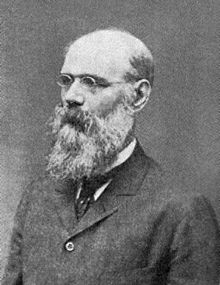Edward Divers facts for kids
Quick facts for kids
Edward Divers
|
|
|---|---|
 |
|
| Born | 27 November 1837 London, UK
|
| Died | 8 April 1912 (aged 74) London, UK
|
| Alma mater | Royal College of Chemistry Imperial College London |
| Scientific career | |
| Fields | Chemistry |
Edward Divers (born November 27, 1837 – died April 8, 1912) was a British chemist. He became very successful even though he had trouble seeing from a young age. From 1873 to 1899, Divers lived and worked in Japan. He made big contributions to science and education there.
Contents
Early Life and Education
Edward Divers was born in London, England. He had a brother and a sister. When he was a baby, an eye problem seriously affected his vision. Even with glasses, he couldn't see very well. Later, in 1884, an accident during an experiment made him completely blind in his right eye.
In 1850, Divers started at the City of London School. There, he became very interested in chemistry because of lectures given by Thomas Hall. By 1853, he was helping out in a chemistry lab at St Bartholomew's Hospital. At first, his boss, John Stenhouse, thought Divers' poor eyesight would stop him from being a good chemist. But Divers proved him wrong!
Divers then worked for other chemists and later went to Queen's College, Galway in Ireland. He studied medicine there, which was one of the few ways to get a science degree back then. He earned his PhD in 1860 and stayed in Galway for 12 years. After that, he taught chemistry and other science subjects in different places in England.
Contributions to Chemistry
Divers joined the Chemical Society in 1860. He started publishing his own experiments in 1862. He studied different chemical compounds, like those involving magnesium, zinc, and ammonium.
In 1871, he discovered new compounds called hyponitrites. He also studied how ammonia and ammonium nitrate react. This work led to what is now known as Divers' solution. This is a special mixture of ammonium nitrate in ammonia.
His work was recognized by many groups. He became a fellow of the Royal Society in 1885. This was a big honor, and he received it while he was still working in Japan.
Life and Work in Japan
In 1873, Edward Divers moved to Japan. At that time, Japan was just starting to learn about Western science and modern ways. Divers was asked to teach chemistry at the Imperial College of Engineering in Tokyo. He later became the head of the college in 1882.
In 1886, his college joined with the Tokyo Imperial University. Divers became the head of the Inorganic Chemistry department there. He stayed in Japan until 1899.
During his time in Japan, Divers was very busy. He taught students and also helped the Japanese government. He analyzed many samples of minerals and metals for the Department of Public Works. He studied Japanese minerals, including how selenium and tellurium were found in sulfur. He even found a new way to separate tellurium from selenium.
Divers also did important work on nitrogen and sulfur compounds. He studied how different acids react to form new compounds. He showed that a special acid called hydroxylaminedisulfonic acid is always the first product when certain acids react.
Inspiring Young Scientists
Edward Divers was known for being a great experimental chemist. He loved doing experiments and encouraged his students to do the same. Many of his students became famous scientists themselves:
- Jōkichi Takamine was the first person to make pure adrenaline.
- Masataka Ogawa discovered a new element he called "nipponium." It was later found to be rhenium.
Divers also advised a student named M. Chikashige to study the atomic weight of Japanese tellurium. They hoped it might be different from European tellurium, but it wasn't.
Later Life and Recognition
Divers faced some sad times in Japan. His son, Frederic, died in China. Later, in 1897, his wife, Margaret, passed away in Tokyo. After these losses, Divers decided to return to England in 1899.
The Japanese government and people highly respected Edward Divers. He worked closely with Itō Hirobumi, who was a very important government minister. Japan recognized Divers' contributions to education by giving him special awards:
- The Order of the Rising Sun of the Third Class in 1886.
- The Order of the Sacred Treasure of the Second Class in 1898.
He was also an honorary member of several Japanese scientific societies. When he left Japan, the Tokyo Imperial University gave him the title of Professor Emeritus. A statue of Divers was put up at the university in 1900 to remember his great work.
Edward Divers had two daughters who both married in Japan. He passed away in London in 1912.
 | Aurelia Browder |
 | Nannie Helen Burroughs |
 | Michelle Alexander |

